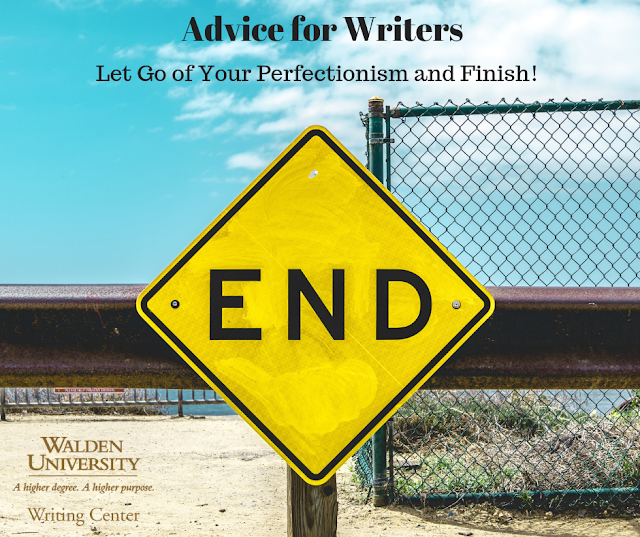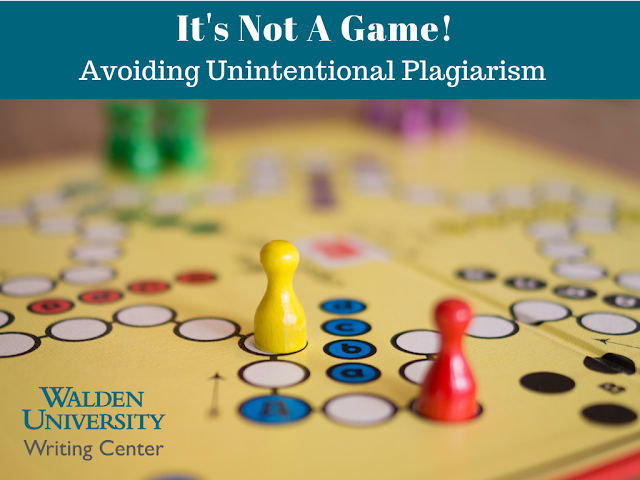Happy New Year!
The Walden University Writing Center will be closed tomorrow, January 1st. We'll return on January 2nd with renewed energy and purpose to continue helping Walden writers on their educational journey.Thank you for reading our blog this past year. We hope it has been inspirational and educational. We'll continue to provide helpful, student-focused writing in the new year. Here's to positive social change in 2019 and beyond!
Keep Writing. Keep Inspiring!

The Walden University Writing Center publishes a new blog post every Monday. Our multimodal writing instruction is presented by Walden University Writing Center Writing Instructors expressly written for an audience of Walden University students. Join our lively conversation in 2019 by subscribing to the blog by clicking the link below!
.png)
Never miss a new post; Opt-out at any time
Thursday Thoughts: January Webinar Schedule
It's the beginning of a new year and a new month! Congratulations on making it this far. Why not mark your calendars to attend and participate in one of our Live Webinar Events in January. We have a whole host of scholarly writing-related sessions planned for you this month. Plus, as a bonus, we've partnered with our friends across Walden University's Center for Academic Excellence for an extra-special student success webinar event! View our listings below and click any of the session titles for more information on how to register.Webinar Calendar
| Title: | What Is Academic Writing? |
| Date: | Thursday, January 3, 2019 |
| Time (Eastern): | 1:00PM - 2:00PM |
| Audience: | All Students |
| Title: | Welcome to the Writing Center |
| Date: | Thursday, January 10, 2019 |
| Time (Eastern): | 8:00PM - 9:00PM |
| Audience: | All Students |
| Title: | Mastering the Mechanics Part 1: Simple Sentences |
| Date: | Tuesday, January 15, 2019 |
| Time (Eastern): | 12:00PM - 1:00PM |
| Audience: | All Students |
| Title: | Essential Academic Skills and Resources for a Successful First Year |
| Date: | Wednesday, January 16, 2019 |
| Time (Eastern): | 8:00PM - 9:00PM |
| Audience: | All Students |
| Title: | Writing Strong Thesis Statements |
| Date: | Thursday, January 24, 2019 |
| Time (Eastern): | 7:00PM - 8:00PM |
| Audience: | All Students |
| Title: | Demonstrating Critical Thinking in Writing Assignments |
| Date: | Wednesday, January 30, 2019 |
| Time (Eastern): | 11:00AM - 12:00PM |
| Audience: | All Students |
The Walden University Writing Center produces webinars that teach APA guidelines and writing skills for all Walden students, along with webinars specifically for undergraduate, graduate, and doctoral capstone students. Webinars offer live writing instruction, as well as an opportunity for students to connect via Q&A and chatting with staff and other Walden students, and each webinar is recorded for later viewing.
.png)
Never miss a new post; Opt-out at any time
Special Webinar Event: Essential Academic Skills & Resources for a Successful First Year
Monday, December 24, 2018
News and Notes
,
Walden University
,
webinars
,
Writing Center Services
1 comment
The Walden University Center for Academic Excellence is excited to share a brand new webinar event taking place on January 16th, 2019. The three offices that make up Walden's CAE, Academic Skills Center, Library, and Writing Center, collaborated to create this session that introduces first-year students to the skills and tools needed to thrive in their first year at Walden. We hope you can join us! Follow this link if you would like more information about this Live Webinar Event
Here is the description of the event for you to look forward to: Welcome to Walden, first-year students! In this webinar, join specialists from the Library, Writing Center, and Academic Skills Center for a discussion on essential scholarly skills such as finding required readings, searching databases, writing in a scholarly fashion, reading effectively, and using good online etiquette. The discussion will also cover where you can find resources to help you achieve academic excellence in your first year, and beyond.
Come prepared to learn about strategies for success, share your educational experience, and prepare to achieve academic excellence in your time at Walden University!
The Walden University Writing Center is one of three divisions that make up the Walden University Center for Academic Excellence. Each of these three are dedicated to the success of Walden students in all facets of their educational journey and provide resources, support, and information that is indispensable as students proceed through their degree programs.
.png)
Never miss a new post; Opt-out at any time
Thursday Thoughts: myPASS Tips and Tricks
The Writing Center will be closed on Tuesday, December 25 and Tuesday, January 1. With the holidays upon us, our paper review schedules are quite full, so we wanted to share some tips and tricks for getting the writing help that you need.
If the schedule is already full, you can join the waiting list to be alerted when any last minute openings might occur. See our paper reviews webpage for waitlist instructions.
When you think ahead, you're more likely to get an appointment at your preferred time. Our myPASS paper review schedules open up two weeks in advance, and you can feel free to schedule your appointment even if your paper isn't ready. Just be sure to upload your paper by 5am EST on your appointment date (see these instructions for attaching your paper). Scheduling in advance will ensure that you're able to include a paper review in your writing process.
If you ever find that you are not able to fit in a paper review appointment before your assignment deadline, we hope you'll take advantage of the other resources on our website, which you can learn more about on our Writing Center services webpage.
Happy holidays! We hope to see you in the Writing Center soon!
If the schedule is already full, you can join the waiting list to be alerted when any last minute openings might occur. See our paper reviews webpage for waitlist instructions.
When you think ahead, you're more likely to get an appointment at your preferred time. Our myPASS paper review schedules open up two weeks in advance, and you can feel free to schedule your appointment even if your paper isn't ready. Just be sure to upload your paper by 5am EST on your appointment date (see these instructions for attaching your paper). Scheduling in advance will ensure that you're able to include a paper review in your writing process.
If you ever find that you are not able to fit in a paper review appointment before your assignment deadline, we hope you'll take advantage of the other resources on our website, which you can learn more about on our Writing Center services webpage.
Happy holidays! We hope to see you in the Writing Center soon!
The Walden University Writing Center provides information and assistance to students with services like live chat, webinars, course visits, paper reviews, podcasts, modules, and the writing center webpages. The center supports students through all stages of the writing process and develops the writer as well as the writing.
.png)
Never miss a new post; Opt-out at any time
So You Want to Revise?
As we’ve discussed in many of our resources and blog posts, revision is an important part of the writing process for all writers. You may have already decided to incorporate revision into your work—great! But even after deciding to revise, you may be wondering, where do I start? Today, I’ll go over some techniques to help you answer this question.First, I suggest finding some patterns in your writing. You might have help doing this if you have feedback from a faculty member or Writing Center instructor, or, you may feel confident in identifying some patterns on your own. Either way, step one to any revision process is re-read your draft.
After you’ve read back through your work, reflect and write down some areas you want to work on. Think of these as larger patterns in your writing first, narrowing down to more minute details. If you have feedback from the Writing Center or your faculty, you can use this as a guideline as well. I recommend identifying larger patterns and making a list for yourself, which can even have sub-categories depending on how detailed you want to be.
Example List of Revision Items
1.) Organization
a.) Thesis
b.) MEAL Plan
2.) Evidence incorporation
a.) APA
b.) Citation frequency
3.) Reference formatting
Once you have your list, I suggest going back through your current draft again one item at a time. In my example above, then, I would read through my draft and think about organization. I could check all my paragraphs for the MEAL Plan and make sure they relate back to my thesis. After I’ve finished working on the MEAL Plan and my thesis, then I can read through again and focus on evidence incorporation and making that smoother. Then, I can read through to be sure I’m citing often enough, then review my references.
This may sound a bit tedious, but it will get easier as you go, I promise! The benefit of having a list like this is that you can keep it in mind (and on record) as you write new drafts as well—that way you can start incorporating small changes and revisions as you write. From paper to paper, you may find that your focus and list of revision topics changes and shifts, and that’s fine too! You can use a revision journal to assist you as well. This process can be as complex or broad as works for you—but I suggest starting out at a broader scope so that you know more specifically what patterns are showing up in your writing. And, remember, the Writing Center is here to support you with our feedback as well as part of this process.
Review of today’s techniques
1.) Re-read your draft/feedback
2.) Make a list of broad to narrow topics to address
3.) Go through your draft and make changes one topic at a time
4.) Keep the list for future reference
Using these techniques and keeping yourself organized will help empower you as you work towards revision! You might also like our two WriteCast episodes that go more into detail about using this method. How are these revision strategies working for you? Let us know if you have any particular successes or other revision tricks!
Claire Helakoski is a writing instructor at the Walden Writing Center. Claire also co-hosts WriteCast, the Writing Center's podcast. Through these multi-modal avenues, Claire delivers innovative and inspiring writing instruction to Walden students around the world.
.png)
Never miss a new post; Opt-out at any time
1.) Organization
a.) Thesis
b.) MEAL Plan
2.) Evidence incorporation
a.) APA
b.) Citation frequency
3.) Reference formatting
Once you have your list, I suggest going back through your current draft again one item at a time. In my example above, then, I would read through my draft and think about organization. I could check all my paragraphs for the MEAL Plan and make sure they relate back to my thesis. After I’ve finished working on the MEAL Plan and my thesis, then I can read through again and focus on evidence incorporation and making that smoother. Then, I can read through to be sure I’m citing often enough, then review my references.
This may sound a bit tedious, but it will get easier as you go, I promise! The benefit of having a list like this is that you can keep it in mind (and on record) as you write new drafts as well—that way you can start incorporating small changes and revisions as you write. From paper to paper, you may find that your focus and list of revision topics changes and shifts, and that’s fine too! You can use a revision journal to assist you as well. This process can be as complex or broad as works for you—but I suggest starting out at a broader scope so that you know more specifically what patterns are showing up in your writing. And, remember, the Writing Center is here to support you with our feedback as well as part of this process.
Review of today’s techniques
1.) Re-read your draft/feedback
2.) Make a list of broad to narrow topics to address
3.) Go through your draft and make changes one topic at a time
4.) Keep the list for future reference
Using these techniques and keeping yourself organized will help empower you as you work towards revision! You might also like our two WriteCast episodes that go more into detail about using this method. How are these revision strategies working for you? Let us know if you have any particular successes or other revision tricks!
Claire Helakoski is a writing instructor at the Walden Writing Center. Claire also co-hosts WriteCast, the Writing Center's podcast. Through these multi-modal avenues, Claire delivers innovative and inspiring writing instruction to Walden students around the world.
.png)
Never miss a new post; Opt-out at any time
Thursday Thoughts: Time to Reflect
2018 may have felt like the longest year ever to exist, but
it is finally drawing to a close. Because many people like to reflect at the
end of things, the Walden Writing Center is jumping in to share some of our
favorite resources related to reflection.
The art of reflecting is about pausing to look at one’s
self, situation, or work. However, at its best, reflection is also about then determining
what to do next. When you think about your writing over this past year, what
will you seek to improve in 2019? What did you do well and want to continue?
We hope you take some time to reflect and some time to reset
for 2019. To help with your writing reflections, check out these writing center
resources:
- In this blog post, get to know more about reflecting your writing, both individual assignments and your entire process
- In this podcast episode doctoral students reflect on residencies and share takeaways for other students
- Learn about how taking a moment to think about feedback canhelp improve your writing
- Anne reflects on her college writing experience, and shares examples of ways to journal about one’s writing process
- Tips for reflecting and improving on our website
- If you are asked to reflect as a course assignment, we have guidance for that too
The Walden University Writing Center provides information and assistance to students with services like live chat, webinars, course visits, paper reviews, podcasts, modules, and the writing center webpages. The center supports students through all stages of the writing process and develops the writer as well as the writing.
.png)
Never miss a new post; Opt-out at any time
Advice for Writers: Let Go of Your Perfectionism and Finish!
Even if you wouldn’t consider yourself a perfectionist, generally speaking (have you seen the state of my laundry piles?), perfectionist thoughts and tendencies have a bad habit of showing up when we sit down to write. For many writers, finishing a writing project has just as much to do with responding to perfectionism as it does with the words on the page. Here are some strategies to combat perfectionism in your writing process. I’ve adapted these strategies from a book that has been helpful to me lately: Finish: Give Yourself the Gift of Done written by Jon Acuff.Cut Your Goal in Half
When we face down a big goal, it can be crippling. We might set the goal with the best of intentions, but if it’s too big, it will be overwhelming rather than motivating. This is why it’s important to break down larger tasks. Instead of “write my literature review,” it’s much easier to work on “find and download ten relevant sources from the library.” The goal of “finish my dissertation” might be paralyzing, but “spend 25 minutes working on an outline for one section” is doable.
If the perfectionist voice in your head is speaking up right now, it’s probably telling you that a smaller goal isn’t good enough, that if you write one chapter by the end of the term rather than two, there is no way you will finish your capstone on time. Actually, one study described in Acuff’s book indicated that when people cut their goal in half, 63% of them increased their performance over previous attempts, and 90% felt more motivated to work on their goal. That’s right: cutting your goal in half can actually make you more productive.
Double Your Timeline
Sometimes it isn’t possible to cut a goal in half. After all, your professor probably expects a full prospectus or capstone rather than one that includes half of what they’ve asked for. In these cases, when you have the control to do so, consider doubling your timeline. You may find yourself feeling anxious at lengthening an already long timeline, but in reality this longer timeline will probably be more reasonable and lead to better, and perhaps even faster, results. For example, Acuff cited a study where one researcher asked students to estimate how long they expected it to take to finish their theses in both the best circumstances and the worst ones. Interestingly, less than 50% of them finished by their longest estimate. This indicates that we often underestimate how long it will take us to complete a task and need to lengthen our timelines to make them manageable.
Do Less to Do More
Of course, there are also times when both the goal and the deadline are fixed, such as when a course assignment is due. When this happens, you need to focus as much attention as possible on achieving your goal within the time allotted. To do this, you’re probably going to have to give something up in another area of your life, at least temporarily. This means disregarding the voice of perfectionism, which will tell you that you can give 100% to your work, school, family, and social lives all at once. Instead, choose what you are willing to let go to achieve your goals. Perhaps that’s a Netflix habit, social media (though not the Walden Writing Center blog, of course!), or doing certain household chores yourself. Is there anything you can eliminate from your busy schedule to allow more time for your goal? If not, how can you simplify what you have to do?
Build in Rewards
In theory, finishing an assignment, class, or degree program should be its own reward, but that’s actually perfectionism talking again. For most people, writing is hard work, so give yourself some rewards for putting in the effort! Maybe you can enjoy your favorite treat or playlist while working on your project to make it feel more enjoyable. When you’ve worked towards a big, long-term goal consistently for a week or a month, do something special for yourself to recognize your hard work. And, of course, make a plan for what you’ll do to celebrate once you’ve finally achieved your goal. These rewards don’t necessarily have to be expensive or time consuming (though they can be, if you like). They should be something that you will find motivating and be able to indulge in guilt-free.
What steps will you take to let go of your perfectionism and finish your writing project?
The tips in today’s blog post have been adapted for Walden writers from Jon Acuff’s Finish: Give Yourself the Gift of Done.
Cheryl Read is a Writing Instructor in the Walden University Writing Center. Her reward for finishing her PhD will be a family trip to Disney World. When she's not helping student writers at Walden, Cheryl stays busy playing with her son and knitting.
.png)
Never miss a new post; Opt-out at any time
Thursday Thoughts: Writing as a Process
Thursday, December 06, 2018
Expert Advice
,
Reading & Writing
,
Scholarly Writing
,
Writing Process
No comments
Did you know that writing is a process? For instance, when you read academic articles, the authors didn’t write their work in one sitting. Instead, they practiced prewriting, drafting, revising, and proofreading strategies to polish their work so that they could present their arguments clearly and effectively to readers. Of course, approaching writing as a process can also help writers with time management issues related to writing, such as writing under deadlines, and writing for a course while juggling work and other responsibilities.
Want to learn more? The Writing Center has several sources
on all stages of the writing process. Don’t forget to share with us what prewriting, drafting,
revising, and or proofreading strategies you use that you find effective!
The Walden Writing Center provides writing resources
and support for all student writers including paper reviews, a podcast, live
chat, webinars, modules, and of course a blog.
.png)
Never miss a new post; Opt-out at any time
It's Not A Game! Avoiding Unintentional Plagiarism
If you’re ever played board games with your family or
friends, maybe you have dealt with someone who cheats at them. Growing up, my
older sister made cheating at board games a science—each time I would catch her
in the act, she would find a new way to cheat next time. These board game
shenanigans meant that playing detective with her cheating was more of the
actual game we were playing. I’m still waiting for the board game police to
show up.
Unlike cheating at board games, though, there are
consequences to academic dishonesty such as plagiarism. Intentional plagiarism is a fairly cut and
dry to understand. When plagiarism occurs, though, it is often unintentional plagiarism.
Unfortunately, that doesn’t mean that it doesn’t carry the same academic
consequences. This isn’t meant to scare you, though, as there are some fairly
easy ways to avoid accidental plagiarism. In this blog post, I want to discuss
two main tips for avoiding plagiarism: correctly citing each sentence that provides
information from a source and correctly paraphrasing points from a source.
Citing Correctly
If you have had a paper review with one of our Walden University Writing Instructors, maybe your instructor
pointed out to you the need to cite each sentence that provides information
from a source, and you wondered, why? For instance, maybe you cited at the end
of a paragraph or cited every other sentence because you were citing the same
source throughout the paragraph. The issue is that each point that comes from a
source is not attributed to a source, so those un-cited sentences suggest to
readers that they are your own ideas when they are actually coming from a
source. Both not attributing ideas to a source and falsely attributing ideas from
a source as your own and are forms of plagiarism.
Correct citation also refers to ensuring direct quotes are properly formatted. For instance, when a direct quote is
included, the page number where the quote was found would be included (as “p.
xx”). For sources with no page numbers, the paragraph number would be included
(as “para. xx”). As well, quote marks
need to be included around the quoted material, otherwise, readers will assume
that the information is a paraphrase. Presenting quoted material as a
paraphrase is a form of plagiarism.
To avoid plagiarism, then, it is important to correctly cite by: 1) ensuring each sentence that provides information from a source
is cited so that information is correctly attributed to the source and not
falsely attributed to you, and 2) ensuring direct quotes are correctly
formatted so the information is not presented as your paraphrase of that
information or point.
Paraphrasing Correctly
Paraphrasing is usually better than quoting since
paraphrasing demonstrates a writer’s command of the material and direct quotes,
especially long ones, can disrupt the flow of points since they are in a
different voice from the author. With this in mind, while incorrectly
presenting a direct quote as a paraphrase is problematic, so is incorrectly
paraphrasing a source. One way a source might be incorrectly paraphrased is
through patchwork paraphrasing which largely means that some of the original source’s wording
is used. For instance, the paraphrase may change a word here and there, or move
around some of the wording of the original source. In this sense, it would be
similar to including a sentence that is a direct quote from a source but
presenting that direct quote as a paraphrase—the original author’s words are
presented as your own. While not as egregious as not citing at all, ineffective paraphrasing can still be considered to be a form of plagiarism.
So, to avoid plagiarism, it is important to paraphrase
effectively. Paraphrasing effectively means that 1) the paraphrase stays true to the original
sources’ meaning, and 2) the paraphrase is in different wording, and has a
different sentence structure, then the original.
I know this seems like a lot of information, but as I noted
in the beginning, the main tips for avoiding plagiarism include correctly
citing each sentence that provides information from a source, or needs to be
supported by a source, and correctly paraphrasing. Plagiarism can be a scary
word, but it doesn’t have to be if you are informed about how to avoid it.
Students can find Walden’s general policy for academic
integrity in the Handbook's Academic Integrity section under Code of Conduct.
While the Writing Center is not involved with any program-specific or overall
university guidance, we do have sources on citing and avoiding plagiarism. For
instance, we have a page on how to cite and how often, a plagiarism prevention checklist, plagiarism prevention modules, and a plagiarism prevention webinar.
Have any questions about avoiding accidental plagiarism?
Have any tips you use to avoid accidental plagiarism? Let us know!
Veronica Oliver is a Writing Instructor in the Walden Writing Center. In her spare time she writes fiction, binge watches Netflix, and occasionally makes it to a 6am Bikram Yoga class.
.png)
Never miss a new post; Opt-out at any time
Subscribe to:
Posts
(
Atom
)















No comments :
Post a Comment